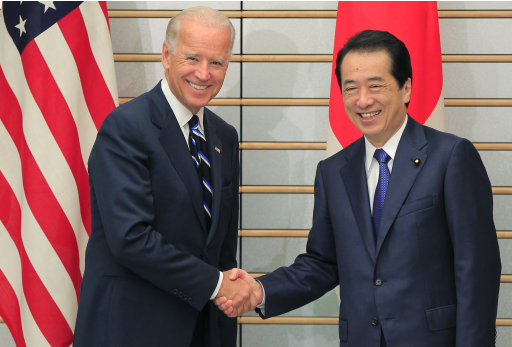U.S. Vice President Joe Biden expressed admiration for the stoicism of the Japanese people in their efforts to recover from the tsunami, as he met Tuesday with Japan's prime minister on the third and final leg of an Asian tour.
Prime Minister Naoto Kan thanked Biden for the United States' "enormous assistance" after the disaster, when among other things American military personnel helped reopen the damaged airport at Sendai, where Biden was to give a speech later Tuesday. He also was scheduled to visit evacuees living in temporary housing along the devastated northeastern coastline.
"Looking at it from afar, it was absolutely breathtaking, heartbreaking," Biden said of the March 11 disaster, which left just over 20,000 people dead and missing. He said the American public was impressed with the stoicism and resolve of the Japanese people, calling it a model for the whole world.
Biden also reaffirmed the countries' alliance and economic ties. Under a security pact, nearly 50,000 American troops stationed in Japan.
Referring to the natural disaster in Japan and budget problems in the U.S., Biden said, "There are voices in the world who are counting us out. They are making a very bad bet."
Kan said Biden's trip — his first to Asia as vice president — demonstrates that "Japan is open for business."
Biden is spending two days in Japan, the final stop of an eight-day trip to Asia that already took him to China and Mongolia.
His visit to Japan comes at a time of widespread speculation that Kan will resign in coming weeks or even days over his administration's perceived lack of leadership in handling the triple crisis — the earthquake, tsunami and nuclear accident at the Fukushima Dai-ichi plant, located between Sendai and Tokyo.
More broadly, Biden's visit comes amid China's rising economic, military and political clout that is somewhat overshadowing Japan, which is wrestling with a two-decade economic slump, bulging deficit and aging population — and now recovery from a threefold disaster.
In China, Biden had extensive face-time with the country's expected future leader, Xi Jinping, and delivered a strong message of the mutual interdependence between the U.S. and China, the world's two biggest economies.
Biden also made the case for continued U.S. economic vitality despite current budget woes and sought to reassure China's leaders and ordinary citizens about the safety of their assets in the United States following the downgrading of America's credit rating.
On Wednesday, Biden plans to visit a U.S. air force base west of Tokyo to thank military and civilian personnel for helping with relief and recovery efforts in the wake of the disaster.
Prime Minister Naoto Kan thanked Biden for the United States' "enormous assistance" after the disaster, when among other things American military personnel helped reopen the damaged airport at Sendai, where Biden was to give a speech later Tuesday. He also was scheduled to visit evacuees living in temporary housing along the devastated northeastern coastline.
"Looking at it from afar, it was absolutely breathtaking, heartbreaking," Biden said of the March 11 disaster, which left just over 20,000 people dead and missing. He said the American public was impressed with the stoicism and resolve of the Japanese people, calling it a model for the whole world.
Biden also reaffirmed the countries' alliance and economic ties. Under a security pact, nearly 50,000 American troops stationed in Japan.
Referring to the natural disaster in Japan and budget problems in the U.S., Biden said, "There are voices in the world who are counting us out. They are making a very bad bet."
Kan said Biden's trip — his first to Asia as vice president — demonstrates that "Japan is open for business."
Biden is spending two days in Japan, the final stop of an eight-day trip to Asia that already took him to China and Mongolia.
His visit to Japan comes at a time of widespread speculation that Kan will resign in coming weeks or even days over his administration's perceived lack of leadership in handling the triple crisis — the earthquake, tsunami and nuclear accident at the Fukushima Dai-ichi plant, located between Sendai and Tokyo.
More broadly, Biden's visit comes amid China's rising economic, military and political clout that is somewhat overshadowing Japan, which is wrestling with a two-decade economic slump, bulging deficit and aging population — and now recovery from a threefold disaster.
In China, Biden had extensive face-time with the country's expected future leader, Xi Jinping, and delivered a strong message of the mutual interdependence between the U.S. and China, the world's two biggest economies.
Biden also made the case for continued U.S. economic vitality despite current budget woes and sought to reassure China's leaders and ordinary citizens about the safety of their assets in the United States following the downgrading of America's credit rating.
On Wednesday, Biden plans to visit a U.S. air force base west of Tokyo to thank military and civilian personnel for helping with relief and recovery efforts in the wake of the disaster.

No comments:
Post a Comment